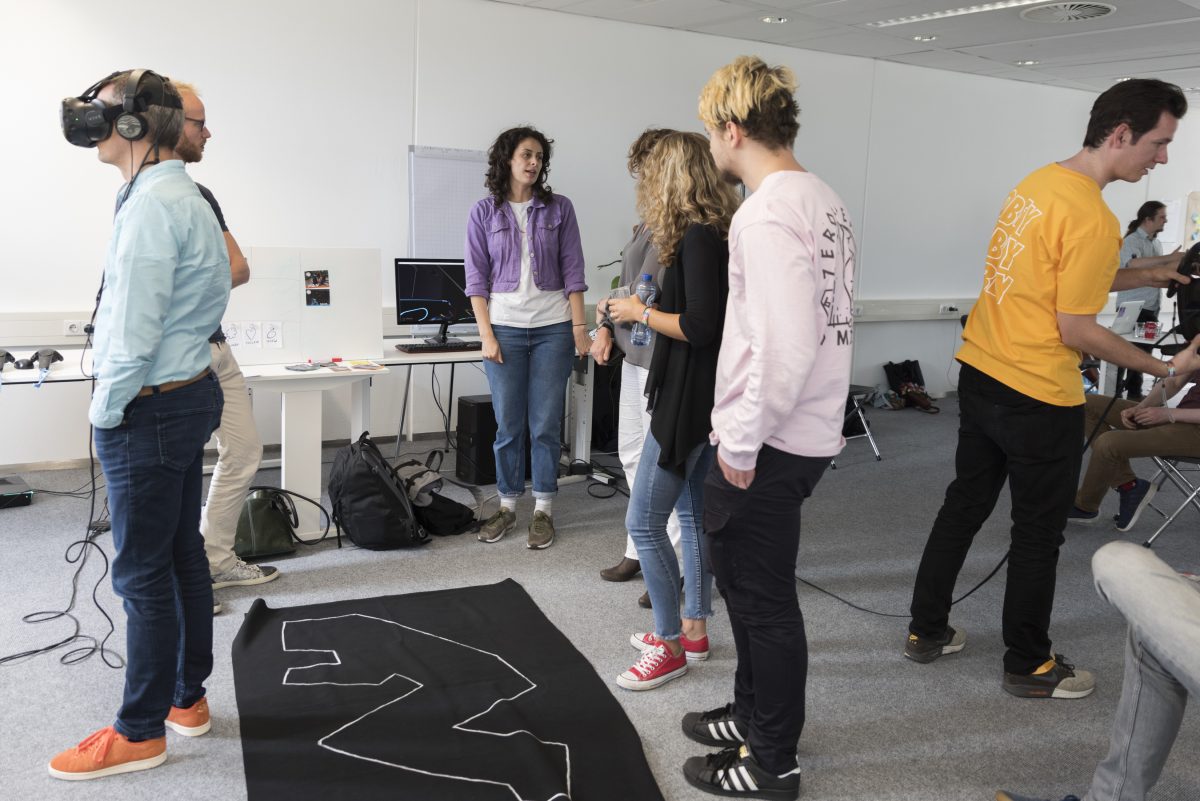Building a VR empathy machine
Format for Virtual Reality lab.
Can we develop concepts for Virtual Reality to immerse the VR-visitor into the backgroundstories of the targetgroup (clients of health, mental and youth care par example) to raise awareness for their motifs, so stronger preventions and policy can be formed?
Interdisciplinairy teams
Different expertises join forces; How can we make the experience of clients transferable to VR visitors so we can learn from it to make stronger policy and preventation? Policy and healthcare workers form interdisciplinairy teams with creatives and interview experience experts about their background stories and the key moments in their lives. The teams work on VR concepts and prototypes following the three step method by Xiomara Vado Soto. All the necessary expertise to come to a VR installation is present, allowing quick steps to be taken in making the prototypes. At the end of the day, the teams presented their concepts and (crappy) rapid prototypes in VR.
Proces and result driven
Besides the VR concepts, the lab also gives a new perspective on the professional activities of the participants; In our approach we focus on emotions and desires instead of facts and needs. The format also gives and insights in the possibilities and strenght of working in VR. In order to be able to work in an interdisciplinary team, it is important to leave your comfort zone. All parties are involved in the often physical and creative creative process, this also provides new input. Vocabulary and method are not automatically shared and require explanation and reflection on the work process.
Three step method by Xiomara Vado Soto
1 – Empathize – What information do you need to prepare the visitor of VR to change perspectives?
2 – Prototype – How can we incorporate this information in a virtual world?
3 – Evaluation – How you construct a dialogue where the visitor is reflecting on the perspective change
We organize labs around various topics. Each lab is customized for different organizations.
Jenny and Xiomara both have the mission to make a positive impact on social subjects through personal stories and technology.
During Bordersessions tech culture festival 2018 in The Hague, APVIS colleague Jenny van den Broeke organised in co-operation with design thinker Xiomara Vado Soto (Garage2020) and Tim van Deursen (Hacktheplanet) the first interdisciplinairy lab session. Youngsters of YOUNG IN PRISON shared their stories and together with the group, we worked to understand the topic from a youngsters perspective and experience.

Photo: Hannah Arends
“The needs of the end user and the practical application in our work is normally the starting point in our development processess. During the VR-lab we were able to set loose by immersing ourselves in the poignant personal stories of the youngsters of Young in prison. Instead of focus on facts, the proces focused on emotion, atmosphere, context and life story. For us, this was a new approach to this case.”
Jantine van Vught
Advisor education Top1000
Participant Building a VR empathy machine during Bordersessions 2018, The Hague, The Netherlands
“I was already familiar with prototyping and design thinking, but this method has taught me to quickly make something visual, so you really have something to talk about and you can immediately spot opportunities and impossibilities.
I found the precense of the expert very impressive and valuable “
Nikki Hes
Interaction designer
Participant Building a VR empathy machine during Bordersessions 2018, The Hague, The Netherlands


